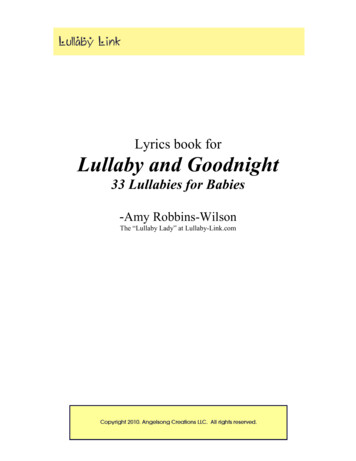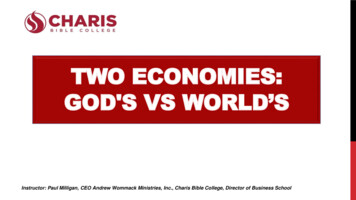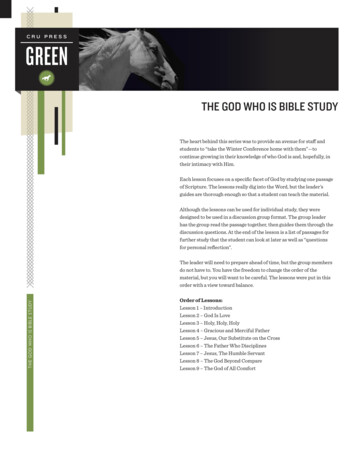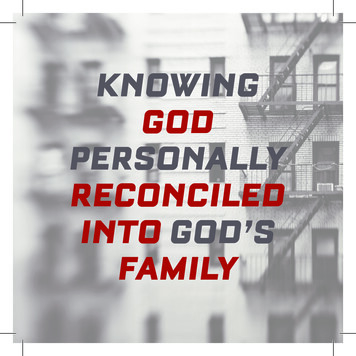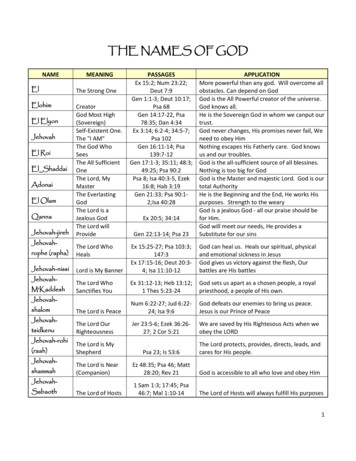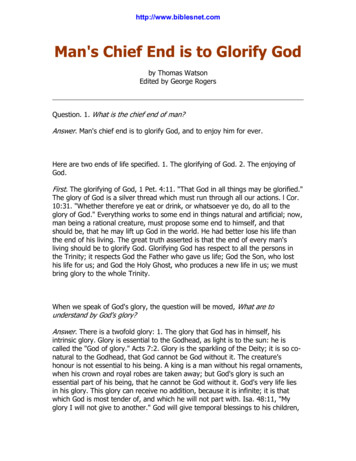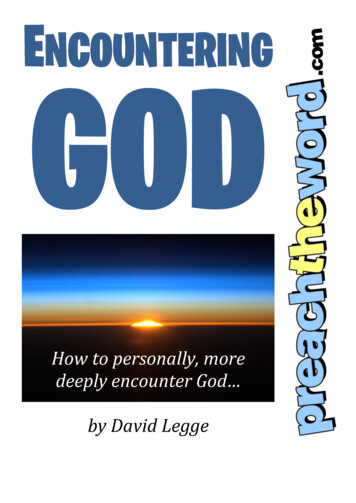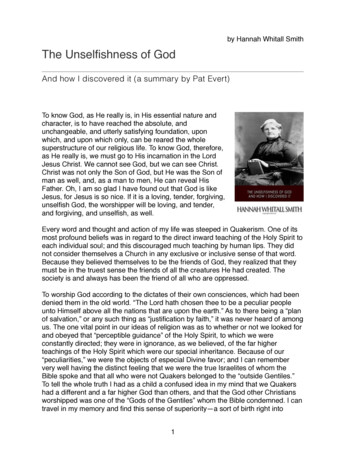
Transcription
by Hannah Whitall SmithThe Unselfishness of GodAnd how I discovered it (a summary by Pat Evert)To know God, as He really is, in His essential nature andcharacter, is to have reached the absolute, andunchangeable, and utterly satisfying foundation, uponwhich, and upon which only, can be reared the wholesuperstructure of our religious life. To know God, therefore,as He really is, we must go to His incarnation in the LordJesus Christ. We cannot see God, but we can see Christ.Christ was not only the Son of God, but He was the Son ofman as well, and, as a man to men, He can reveal HisFather. Oh, I am so glad I have found out that God is likeJesus, for Jesus is so nice. If it is a loving, tender, forgiving,unselfish God, the worshipper will be loving, and tender,and forgiving, and unselfish, as well.Every word and thought and action of my life was steeped in Quakerism. One of itsmost profound beliefs was in regard to the direct inward teaching of the Holy Spirit toeach individual soul; and this discouraged much teaching by human lips. They didnot consider themselves a Church in any exclusive or inclusive sense of that word.Because they believed themselves to be the friends of God, they realized that theymust be in the truest sense the friends of all the creatures He had created. Thesociety is and always has been the friend of all who are oppressed.To worship God according to the dictates of their own consciences, which had beendenied them in the old world. “The Lord hath chosen thee to be a peculiar peopleunto Himself above all the nations that are upon the earth.” As to there being a “planof salvation,” or any such thing as “justification by faith,” it was never heard of amongus. The one vital point in our ideas of religion was as to whether or not we looked forand obeyed that “perceptible guidance” of the Holy Spirit, to which we wereconstantly directed; they were in ignorance, as we believed, of the far higherteachings of the Holy Spirit which were our special inheritance. Because of our“peculiarities,” we were the objects of especial Divine favor; and I can remembervery well having the distinct feeling that we were the true Israelites of whom theBible spoke and that all who were not Quakers belonged to the “outside Gentiles.”To tell the whole truth I had as a child a confused idea in my mind that we Quakershad a different and a far higher God than others, and that the God other Christiansworshipped was one of the “Gods of the Gentiles” whom the Bible condemned. I cantravel in my memory and find this sense of superiority—a sort of birth right into1
by Hannah Whitall SmithDivine grace and favor. I believe every young “Friend,” in the circle to which Ibelonged, would have owned to the same feelings. We were God’s “chosen people,”and, as such, belonged to a religious aristocracy as real as any earthly aristocracycould be.I grew up with a distinct idea that we “Friends” had practically a monopoly of “TheTruth,” the comparative unimportance of creeds and dogmas, or of rites andceremonies, the abhorrence of slavery, the vital importance of temperance, thedirect access of the soul to God without human intermediary.THE FIRST EPOCH IN MY RELIGIOUS LIFE (THE AWAKENING)But a change was at hand, although I little knew it. My soul was awaking from itstorpor, and, like the butterfly in the cocoon, was struggling to escape from the bondsthat had hitherto held it in leash. My long search after God was about to begin. Afriend has taught me, not in so many words but quietly, by her influence, that I havea mission to fulfill on earth, and straightway I must set to work to perform it. I may bedestined for some great work. I feel that within me which tells me I could accomplishit. The happiness of being born into a universe so limitless, so magnificent, soglorious, was too great. My one question for many years was as to how I could winthe God who possessed it over to my side. My soul was athirst to make myselfworthy of the glorious destiny of which I seemed to have had a glimpse. It was themagnificence of God that had enthralled me, from the age of sixteen onwards are asad illustration of the false methods of religion which were all I knew. I cannotunderstand my feelings. Such a hungering and thirsting after righteousness, and yet,except in a few moments of retirement (when I write in my diary), such lightness, andgaiety, and indifference. It seems to me almost wrong to laugh, and yet I indulge in itcontinually. I know not how God can look upon me even in pity, I am so wicked. Ohhow awful to feel that I have of myself no power even to think a holy thought, and yetI must gain the salvation of my soul. I cannot repent, I cannot love my Savior, and Ido not believe I ever will. What, what shall I do?” But the inward change I cannoteffect, and yet I am accountable if it is not effected.But after I had learned that the facts of religion were far more important than myfeelings about these facts, and had consequently given up looking at my feelings,and sought only to discover the facts, I became always happy in my religious life,and had, without any effort, the very feelings of love to God, and of rest and peaceand joy in my soul that before I had so vainly tried to work up. During all the yearshowever of which I speak, from the age of sixteen to twenty- six, I knew nothing ofthis. God was to me a far off, unapproachable Being, whom, in spite of all my eagerand painful searching, I failed utterly to find. I had not the slightest conception ofwhat the expression “God is love” meant. Of all His loving and beautifulunselfishness, which I was afterwards to discover, I had for all these years not thefaintest glimpse. Instead of being concerned as to how the judge felt about him,should spend all his efforts in trying to see how he felt about the judge. Instead ofbasing my feelings upon my knowledge, I was seeking to base my knowledge uponmy feelings. I found myself being driven into absolute unbelief. Manifest evidences I2
by Hannah Whitall Smithseemed to see of an imperfect creation in my own life and in the lives of others,where failure was generally the rule, and success only the exception, appeared tome incompatible with the idea of a wise and sensible Creator, not to say a goodOne, such as I had been told I must believe in.SECOND EPOCH IN MY RELIGIOUS LIFE (RESTORATION OF BELIEF)God was making Himself manifest as an actual existence, and my soul leaped up inan irresistible cry to know Him. I want it to be clearly understood that it all came tome as a discovery, and in no sense as an attainment. It seemed to me the mostmagnificent piece of good news that any human being had ever had to tell, and Igloried in telling it. Meanwhile I had got my first glimpse of the unselfishness of God.As yet it was only a glimpse, but it was enough to make me radiantly happy.So that gradually the opposition died down, and in the end, while the “solid Friends”could not fully endorse me, they at least left me free to continue my courseunmolested. The disapproval of my own religious society, in these early stages of mynew life, threw me very much under the influence of the Plymouth Brethren, I cannever be thankful enough to the Plymouth Brethren for introducing me to thefascinations of Bible study. I had begun to know God, and I was finding Him to belovely and lovable beyond my fondest imaginings.The awful sense of responsibility that rested upon him, because of the things doneby the creature he had created, opened my eyes to see the responsibility God mustnecessarily feel, if the creatures He had created were to turn out badly.THE THIRD EPOCH IN MY LIFE (THE RESTITUTION OF ALL THINGS)I began to feel that the salvation in which I had been rejoicing was, after all, a verylimited and a very selfish salvation, and, as such, unworthy of the Creator who hasdeclared so emphatically that His “tender mercies are over all His works,” and aboveall unworthy of the Lord Jesus Christ. And I began to understand how it was that theleast He could do would be to embrace with untold gladness anything that wouldhelp to deliver the beings He had created from such awful misery. Nothing couldsatisfy me but that every human being should in the end be saved, and therefore Iam sure that nothing less will satisfy Him. I saw therefore that the remedy mustnecessarily be equal to the disease, the salvation must be as universal as the fall.This secret feeling that His love could not stand the test of comparison with the idealof love in my own heart. I knew that, poor and imperfect as my love must be, I couldnever have enjoyed myself in Heaven while one of my children, no matter hownaughty, was shut out; and that He could and did enjoy Himself, but now I found outthat He was far more than loving;—He was love, love embodied and ingrained.Every doubting question was answered, and I was filled with an illimitable delight inthe thought of having been created by such an unselfish God. The duties ofownership blazed with a tremendous illumination. My children have been the joy ofmy life. I cannot imagine more exquisite bliss than comes to one sometimes in thepossession and companionship of a child. If I, a human being with limited capacity,can find such joy in my children, what must God, with His infinite heart of love, feel3
by Hannah Whitall Smithtowards His! That what we call self-sacrifice on the part of Christ was simply theabsolutely necessary expression of His love for us; and that the amazing thing wouldhave been, not that He did it, but if He had not done it. Unless He can be proved tobe absolutely good, and absolutely unselfish, and absolutely just, our case isabsolutely hopeless. God only is our salvation, and, if He fails us, in even theslightest degree, we have nowhere else to turn.And on this ground I have always rather enjoyed being considered a heretic, andhave never wanted to be endorsed by any one. I do not choose to sail under falsecolors, and I am a thousand times stronger in my views of restitution every day I live.I stood amazed before the breadth, and length, and depth, and height of it, andwondered, with an endless wonder, how I could ever have supposed for a singleinstant that a Divine love could have had any limitations.THE FOURTH EPOCH IN MY RELIGIOUS LIFE (THE LIFE OF FAITH)My soul it is true was at rest as to my future, but in the present it was racked andtorn by a thousand daily cares and anxieties. The very fruits of that Spirit, which as aChristian, I believed I had received, were love, joy, peace, long-suffering, gentleness,meekness, goodness, and these were just the very things in which I knew myself tobe the most deficient. To be a child of God, and yet to be unable to act like one,made me wonder whether I could have missed something in religion which wouldhave given me victory, and I determined to find out if possible what that somethingwas. Why was it, I asked myself over and over, that the God, who had planned sucha glorious deliverance for us in the future, had not also planned a better deliverancein the present?It seemed to me that God ought not to have allowed it, and that I had a right togrumble and fret. I was afraid that I was going to lose every bit of religion Ipossessed. I wanted more than forgiveness, I wanted deliverance. “Not I, but Christ,”and that the victory I sought, was to come by ceasing to live my own life, and byletting the power of God “work in me to will and to do of His good pleasure.” It is aMethodist doctrine, and I have been used to hearing Methodists much objected to onaccount of it. I was ‘frustrating’ the grace of God as really in regard to mysanctification as those whom I have been used to condemn so utterly as legalists,were doing it in regard to their justification. I could easily see how they made thedeath of Christ of none effect by their legal strivings, but I was blind to the fact that Ialso was doing the same thing. When I trust Him He gives me deliverance from thepower of sin as well as from its guilt. Had it actually been in the Bible all theseyears? And, if it had, why had I never seen it? No longer did I need to care for, andprotect, and fight for myself. I committed the whole matter of my rebellious spirit tothe Lord, and told Him I could not conquer it, but that I believed He could conquer itfor me; and then I stood aside, as it were, and left the battle to Him. And to myindescribable joy I found all my rebellion taken away, and such a spirit of peacefulacquiescence in the will of God put into its place. I realized that it was a wonderful4
by Hannah Whitall Smithtruth that I had no need to fight my own battles, for the Lord fought for me, and Icould hold my peace.Again I want to make the fact clear that, just as it was before, what had come to menow was a discovery, and in no sense an attainment. I had not become a betterwoman than I was before, but I had found out that Christ was a better Savior than Ihad thought He was. I was not one bit more able to conquer my temptations than Ihad been in the past, but I had discovered that He was able and willing to conquerthem for me. I had no more wisdom or righteousness of my own than I had ever had,but I had found out that He could really and actually be made unto me, as theApostle declared He would be, wisdom, and righteousness, and sanctification, andredemption. And, what was even better than this especial deliverance, I had learnedthe magnificent fact that the inexhaustible storehouse of God’s supplies lies alwaysopen to the needs and claims of His children. There was stored up for me in Christ aperfect supply for all my needs, and that faith and faith only was the channel throughwhich this supply could flow; that struggling, and wrestling, and worrying, andagonizing, cannot bring this supply, but that faith always will and always does. Thesewere gifts rather than the word attainments. Attainments imply work and effort on ourpart, and Christian graces are all a free gift from God. Those who are to “reign in life”are not those who attain to great heights of piety, but those who “receive abundanceof grace, and of the gift of righteousness.” My joy was joy in the Lord, and not joy inmyself, nor in any attainments of my own.My eyes, before and after this glorious discovery, looked at the same Bible, andeven read the same passages, but saw very different things. I felt that in the truth, asI held it, there was a painful want of that spirit of love which is the uniting bond of theChurch of Christ, and which the Scriptures declare is so much more and better than“all knowledge” and “all faith”; and I often expressed my growing conviction thatthere was some truth yet to break out of God’s word that would fill our hearts with alove that could bear all things. It was not a perfection in the flesh that they weretalking of, but a death of the flesh. Our part, we saw, was simply surrender and faith,and God’s part was to do all the rest. I always thought you had to put your will into it,and just do it yourself. I expect there are lots of people like I was, who want to begood and don’t know how.Christ had been revealed to us, not as our future Savior only, but as our present andcomplete Savior now and here, able to keep us from falling, and to deliver us out ofthe hands of all our enemies.With my eyes thus opened to see the absolute goodness and unselfishness of God,I experienced a complete change of mind in regard to His will. In the past I hadlooked upon God’s will as being against me, now I had found out that it was for me. Ihad thought it was something to be afraid of, now I saw it was something to beembraced with joy. We may be certain therefore, more certain than we are that thesun will rise tomorrow, that God’s will is the most lovely thing the universe contains5
by Hannah Whitall Smithfor us; and this, not because it always looks or seems the best, but because itcannot help being the best, since it is the will of infinite unselfishness and of infinitelove. But with my discovery of the infinite unselfishness of God, I came to realize thatconsecration to Him was not an attainment but a priceless privilege; and I cannot butfeel sure that if people only knew the loveliness of His will, not a devout few only, butevery single soul in the universe would rush eagerly to choose it for every moment oftheir lives. An old writer has said that God’s will is not a load to carry, as so manythink, but is a pillow to rest on.The generation that is passing must give place to the one that is coming, and mustkeep hands off from interfering. In this connection it is very striking to notice in thehistory of the Israelites how at the age of fifty they were, by the Divine order, retiredfrom public service, whether in the Tabernacle or in the Army. “And from the age offifty years they shall cease waiting upon the service thereof, and shall serve nomore.”He has poured Himself out without stint for His children, and we must do the samefor ours. Having discovered the unselfishness of God, as everyone who has lived tobe seventy ought to have done, our attitude towards all around us, should be, up toour measure, one of a similar unselfishness. I have had a few faint glimpses of thisglory now and here, and it has been enough to ravish my heart. But there I shall seeHim as He is, in all the glory of an infinite unselfishness which no heart of man hasever been able to conceive; and I await the moment with joy.6
Jesus Christ. We cannot see God, but we can see Christ. Christ was not only the Son of God, but He was the Son of man as well, and, as a man to men, He can reveal His Father. Oh, I am so glad I have found out that God is like Jesus, for Jesus is so nice. If it is a loving, tender, forgiving, unselfish

